Solar Panel Cleaning Cost
Last updated 2nd July, 2025
With green energy sources on the rise, homeowners are looking at ways to decrease their carbon footprint, and installing solar panels is becoming a popular choice. But, once the solar panels are installed, what kind of maintenance do they need?
It costs between £4 and £15 to clean one solar panel, but the overall project price will be affected by a number of different factors.
In this article, we’ll examine the cost of cleaning solar panels to ensure their efficiency and longevity, any additional costs you should be aware of when seeking quotes, and how to find and hire a professional solar panel cleaning company to do the job for you safely and effectively.
Let’s jump in.
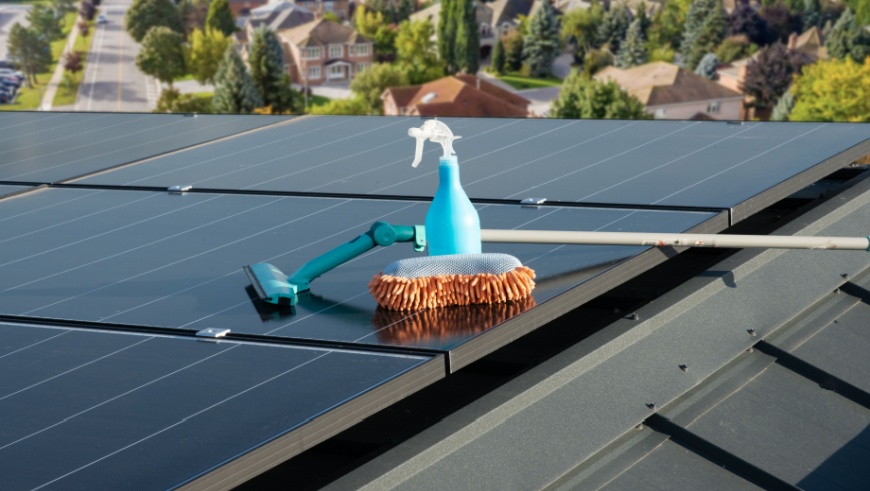
Table of Contents
- How much does it cost to clean solar panels?
- Solar panel cleaning prices
- Additional solar panel costs
- Labour cost to clean solar panels and time frames
- Factors that impact solar panel cleaning costs
- What does cleaning solar panels involve?
- What are the benefits of cleaning solar panels?
- DIY solar panel cleaning
- Building regulations and safety
- FAQs
- How to find and hire a solar panel cleaner
- Sources
How Much Does It Cost to Clean Solar Panels?
Over time, debris can build up–dust and pollen, bird droppings, and fallen leaves–which can reduce the volume of sunshine that can reach your solar panel’s photovoltaic cells and therefore reduce your energy output. Cleaning solar panels can help to maintain their efficiency and maximise their energy production, so once you’ve had the panels installed, you must integrate regular cleaning into your property’s maintenance routine.
It costs between £4 and £15 to clean one solar panel–but the overall project price will be affected by a number of different factors.
Here’s a closer look at those variables:
Size of Installation and Number of Solar Panels
Prices will increase and decrease in direct relation to the number of panels you have installed. Similarly, whether your solar panels are mounted on your property’s roof, or are ground-mounted, will have an impact on your project’s price.
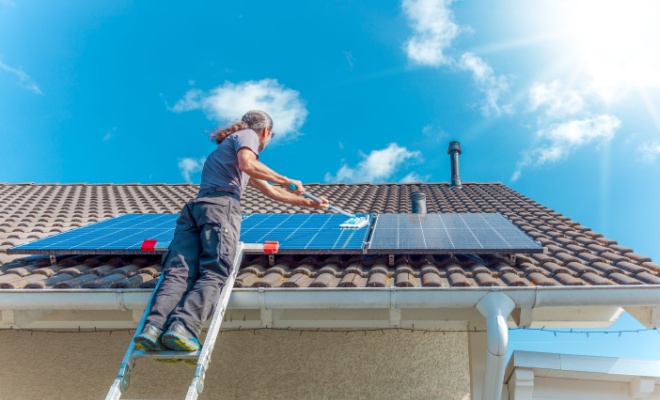
Professional solar panel cleaners are trained to work at height, and the extra equipment and safety precautions will bump up your cleaning costs. On the ground floor, 20 panels can cost between £50 and £80 to clean, while 20 panels above one storey can be closer to £100.
Ease of Access and Accessibility Requirements
As we’ve just mentioned, your prices will be impacted by your solar panels’ height. If you have a particularly high building spanning multiple storeys, your contractor may need scaffolding to reach them, which will raise your prices even more. Scaffolding for an average semi-detached house can cost between £650 to £800.
In addition to your ease of access, if your contractors need to work across a public right of way–such as a pavement or shared drive–extra considerations will need to be made to ensure the safety of the workers and those around them while the cleaning is carried out.
Cleaning Frequency
Your individual circumstances will most likely set your cleaning frequency. If you have large trees surrounding your house and frequently encounter fallen leaves or branches, you will need a higher volume of cleaning to keep your panels in good condition.
Similarly, if you have experienced seasonal changes–such as prolonged periods of dry weather–dust and debris are more likely to have built up as they aren’t being naturally washed away by rain, which will require prompt attention.
While solar panels are technically “self-cleaning” because of their hydrophobic properties, rainwater alone will not wash away all the dirt and grime that can build up over time.
Solar Panel Cleaning Prices
With these factors in mind, let’s take a look at some estimated solar panel cleaning costs:
| Activity | Total Estimated Cost |
|---|---|
| Clean <20 solar panels (ground floor, residential property) | £50 to £80 |
| Clean <40 solar panels (ground floor, commercial property) | £100 to £150 |
| Clean <20 solar panels (above one storey, residential property) | £60 to £100 |
| Clean <40 solar panels (above one storey, commercial property) | £150 to £200 |
| Clean >40 solar panels (above one storey, commercial property) | £150 to £300 |
Prices for solar panel cleaning will climb in relation to the height at which the worker needs to be–ground-level work is cheaper than one storey and above, for instance. Cleaning fewer than 20 solar panels at ground floor level on a residential property will cost between £50 to £80, while the same number at a height of one storey and above will cost between £60 to £100.
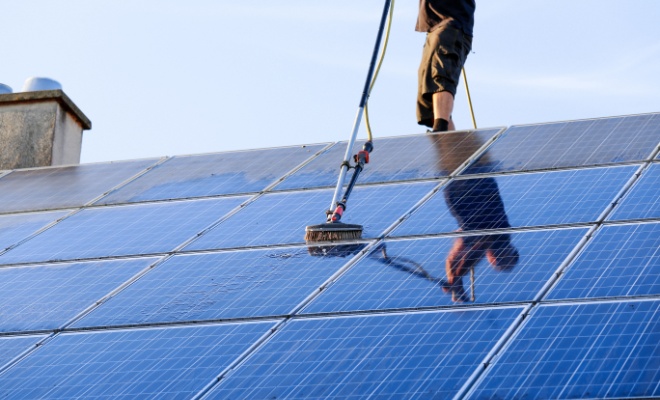
For larger properties, such as commercial residences with more than 40 solar panels above one storey, the cost will rise to between £150 and £300.
Ground-mounted solar farm cleaning requires professional, specialist attention and a different approach than cleaning residential properties. In these instances, it’s best to contact a company directly to get an individual quote based on your solar farm’s size and solar panel quantity.
Additional Solar Panel Costs
On top of the standard solar panel cleaning fee, there are some additional costs to be aware of:
Scaffolding Hire and Additional Access Requirements
To be clear: scaffolding should not typically be required by a tradesperson to clean the solar panels on a bungalow, terrace, semi-detached, or detached property.
But if your property spans multiple floors or has particularly tricky access requirements, scaffolding hire might be necessary to enable your professional cleaners to reach the areas safely. While your contractor may incorporate this into their project fee, access to a semi-detached house's roof is likely to cost around £650 to £800.
If you have a terraced house with solar panels, extra considerations will be needed to enable the safe cleaning of the surface. To do so, special working at height equipment may need to be placed on public rights of way, such as pavements, which can incur additional fees if the area needs to be closed off periodically for the work to be carried out.
Window Cleaning
Regular window cleaning is important for the maintenance of your property. Clean windows boost kerb appeal and allows more natural light into your home, making it a brighter living space.
On average, it can cost between £10-£20.
Solar Panel Cleaning Cost Breakdown Calculator
The total cost for cleaning solar panels on a standard-sized UK detached property: £100
Materials
£10
Labour
£90
Waste Removal
£0
Labour Cost to Clean Solar Panels and Time Frames
Professional solar panel cleaning companies typically have a price list detailing their charges. When you’re collecting quotes from at least three traders, be sure to ask for these price lists so you can easily compare their fees.
Prices will typically be flat fees based on the size of your home and the number of solar panels, considering their location (ground floor, one storey or higher, etc.). This means that labour fees will naturally be rolled into the price, but it’s always prudent to double-check this with your trader before signing the contract to ensure you are fully clued up.
How Long Will Cleaning Solar Panels Take?
The total time needed to clean solar panels will vary depending on their size and number.
Small sets of panels located on the ground can be cleaned in around 30 minutes, while larger collections on higher ground can take upwards of 2 hours to clean.
Factors That Impact Solar Panel Cleaning Costs
As you’d expect, there are a number of factors that can influence the cost of your solar panel cleaning project. While some can’t be avoided–such as your geographical cost influences–some are worth bearing in mind to reduce your cleaning costs over time:
Type of Installation
While we’ve already covered how the location of your solar panels can impact your cleaning price, your roof type will also play a role. Solar panels are most commonly seen on naturally sloped roofs, but they can also be installed on flat roofs with a mounting rig to angle the panels.
You can even have solar panels installed on your property’s walls if your roof doesn’t receive sufficient sunlight, or is obstructed by trees. Depending on your installation, the cost of your cleaning service will differ based on the complexity involved in cleaning at that location–the trickier the access, the higher the price.
Panel Placement and Tilt
Solar panels can be installed at different “tilt” levels, typically ranging from 20 to 50 degrees. Those installed with smaller tilts will commonly face greater debris build-up as the dirt won’t be able to run off as naturally as it would on higher degrees of tilt.
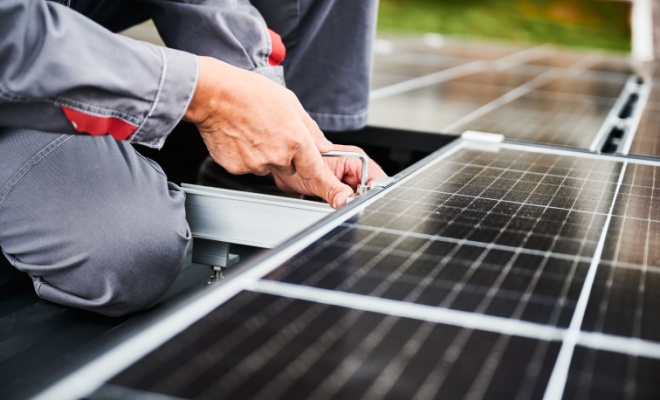
If you are having solar panels installed for the first time, ensure that you follow the manufacturer’s guidelines to achieve the optimum tilt level to help aid debris run-off.
Ease of Access
As you know by now, prices will be impacted by your solar panel height. If your panels are at a particularly hard-to-reach location, you can expect costs to rise due to reduced ease of access. For high installations, scaffolding may even be required, which can influence your costs further.
In addition to ease of access, if your contractors need to work across a public right of way–such as a pavement or shared drive–extra considerations will need to be made to ensure the safety of the workers and those around them while the cleaning takes place.
Local Variations
Costs are likely to differ depending on your geographical location. Fees are commonly below average in northern England, Scotland, and Northern Ireland, while higher prices are generally found in the southeast, with London typically being the most expensive area.
What Does Cleaning Solar Panels Involve?
Your professional solar panel cleaner will typically take the following steps when arriving at your property to conduct their service:
- Assessment of Solar Panels and Bank
The contractor will first assess your solar panels, inspecting their surface to note any damage or cracks and inspect the power bank and associated cabling to ensure there is no damage. If issues are identified, the cleaning won’t take place until these problems are rectified.
The contractor will also check to see how much power is being generated by each panel and compare these with the manufacturer’s approximation to identify any specific problem areas to focus on for cleaning. This can also help show if any panel is broken. - Turn Off The System
Once this step has been completed successfully and the contractor is happy to continue, the entire system will be shut down and switched off. - Access Solar Panels
When the system is completely turned off, the contractor will start accessing the solar panels. This can involve different steps depending on your solar panels’ location. If scaffolding is required, it will need to be set up before your contractor can begin cleaning. - Clean the Solar Panels
The solar panels can then be cleaned using professional, industry-recommended materials. It’s important to make sure that your contractor is using the right cleaning materials for your specific type of solar panel, as failure to do so can damage the solar panel’s surface and invalidate your warranty. - Restart the System
When the contractor has finished cleaning and the solar panels have been dried, the contractor can then turn the system back on again to ensure everything is working as it should, comparing the earlier energy readings with the new versions. If there are still issues with energy generation following cleaning, it might mean there is a bigger problem with one of your solar panels, and that specific unit might need replacing.
What are the Benefits of Cleaning Solar Panels?
More homes have solar panels than ever before, with green energy initiatives encouraging households to install green energy solutions. However, this does mean that homeowners need to factor the solar panel cleaning cost into their annual budgets.
So, what are the benefits of cleaning your solar panels?
Improved Energy Efficiency
Anything that stops sunlight from reaching your solar panels contributes to reducing how effective they are. This can include:
- Bird droppings.
- Leaves and other tree detritus.
- Pollen.
- Dust.
It can be surprising how much debris can build up on your solar panels. Homes in rural and coastal areas are affected because of the amount of natural dust and droppings circulating, while urban areas can suffer from the effects of local pollution issues.
Cleaning your solar panels can remove these layers of grime and let more sunlight hit the panels.
Financial Benefits
Tied into energy efficiency, there are financial benefits to having cleaner solar panels.
For example, generating more energy for your home via solar panels can reduce other energy bills. Plus, if you export energy back to the grid, producing more energy through cleaner solar panels means higher returns for you.
Increased Lifespan
If debris is allowed to build up on solar panels, it may eventually have an effect on the panel itself by allowing moisture to collect on the surface. This can lead to corrosion of the panel or poor performance.
So, regular cleaning of your solar panels can reduce the possibility of damage, potentially increasing the lifespan of the system.
Another bonus is that your cleaning professional might spot issues such as loose connections or corrosion before they become huge problems, allowing for repair rather than the need to replace the whole panel.
Warranty Reasons
Some solar panel manufacturers may specify that regular cleaning must be carried out on solar panels or any warranty will be rendered invalid. Check your paperwork to see if this is the case.
Maintain Appearance
Shabby solar panels can make your home's exterior look shabby. Particularly if you're trying to sell your property or simply improve its external appearance, the cost of cleaning solar panels can be a worthwhile investment.
DIY Solar Panel Cleaning
If your solar panels are in an inaccessible location–such as your property’s roof–it isn’t recommended that you clean them yourself. This is because you won’t be trained to work at height and will not have the necessary safety equipment to carry out the work.
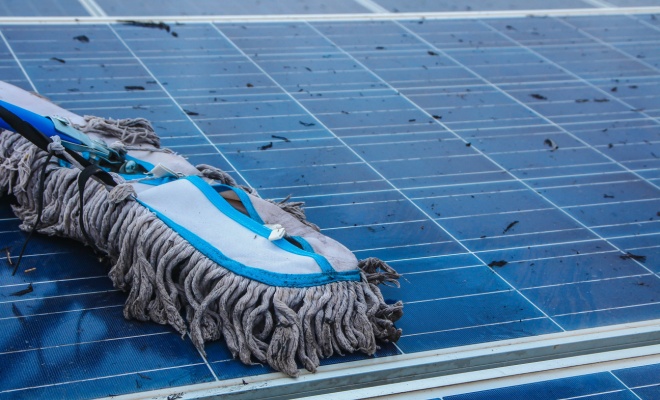
For solar panels that are ground-mounted, if you have the necessary tools and are comfortable in doing so, you can look to clean these yourself–but there are various steps you need to consider beforehand to ensure the system is safe for you to work on:
- The system needs to be fully turned off before any cleaning begins. If you’re not sure how to do this or aren’t sure if you’ve completely turned everything off, it’s best to stop and call in the professionals to ensure a safe job.
- If you notice any damage to the solar panels upon inspection, such as damaged cables or cracked solar panels, stop working immediately and call a professional. Damage to cables can cause potential high-voltage risks and shouldn’t be touched.
- Specialist cleaning equipment suitable for your type of solar panels needs to be used. If you use the incorrect products and damage the surface, you can invalidate your warranty and cause damage to the panels themselves, which will need remedying.
If you are unsure about any aspect of cleaning your solar panels, it’s best to call in professional solar panel cleaners to take care of the job for you in a safe and efficient way.
Building Regulations and Safety
Solar panel cleaning requires the contractor to be aware of working at height regulations. The Health and Safety Executive states that all work at height must be:
- Properly planned and organised
- Those working at height are competent in doing so
- Risks from work at height have been assessed, and appropriate work equipment has been selected and used
- Risks from fragile surfaces have been properly controlled
- Equipment for work at height has been properly inspected and maintained
When looking for a suitable solar panel cleaning company, make sure to enquire about their working at height protocols to ensure they are well informed and adhering to the guidance. Due to these regulations, it’s recommended that you don’t attempt to clean your solar panels at height by yourself as a DIY project–it’s always best to get the professionals in to take care of it for you.
FAQs
Over prolonged periods of time, lack of cleaning can eventually lead to permanent damage if debris is left to corrode on the surface. In these circumstances, removal and replacement will be required–far more expensive than periodic cleaning would be. Failure to clean may also invalidate some solar panel warranties.
How to Find and Hire a Solar Panel Cleaner
If the time has come to give your solar panels a spruce, or you have noticed their efficiency has dropped and think a build-up of dirt and grime might be to blame, it’s time to get in touch with a professional solar panel cleaning company to carry out the work for you.
Bear the following things in mind:
- Don't accept the first quote you receive. You won't know whether this is a fair price, so be sure to get quotes from at least 3 contractors.
- Don't be pushed into accepting a quick job at a suspiciously low price, especially if the tradesman doesn't seem to be aware of the rules and regulations we've discussed above. They may be a rogue trader or someone who doesn't care much for safety issues.
- Do check the quote for anything you may not have agreed to. Ironing out any discrepancies before a contract is signed is far easier than trying to dispute something after the work has begun and you’re committed to a certain price.
- Do ask your tradesman to explain anything you're not sure about. Reputable contractors don't mind answering questions.
Be sure to check the trader’s experience and qualifications carefully. As we have already mentioned, solar panel cleaning requires the contractor to be aware of the working at height regulations, as laid out by the Health and Safety Executive.









